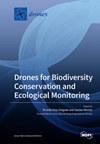Robust Collision-Free Guidance and Control for Underactuated Multirotor Aerial Vehicles
IF 4.4
2区 地球科学
Q1 REMOTE SENSING
引用次数: 0
Abstract
This paper is concerned with the robust collision-free guidance and control of underactuated multirotor aerial vehicles in the presence of moving obstacles capable of accelerating, linear velocity and rotor thrust constraints, and matched model uncertainties and disturbances. We address this problem by using a hierarchical flight control architecture composed of a supervisory outer-loop guidance module and an inner-loop stabilizing control one. The inner loop is designed using a typical hierarchical control scheme that nests the attitude control loop inside the position one. The effectiveness of this scheme relies on proper time-scale separation (TSS) between the closed-loop (faster) rotational and (slower) translational dynamics, which is not straightforward to enforce in practice. However, by combining an integral sliding mode attitude control law, which guarantees instantaneous tracking of the attitude commands, with a smooth and robust position control one, we enforce, by construction, the satisfaction of the TSS, thus avoiding the loss of robustness and use of a dull trial-and-error tweak of gains. On the other hand, the outer-loop guidance is built upon the continuous-control-obstacles method, which is incremented to respect the velocity and actuator constraints and avoid multiple moving obstacles that can accelerate. The overall method is evaluated using a numerical Monte Carlo simulation and is shown to be effective in providing satisfactory tracking performance, collision-free guidance, and the satisfaction of linear velocity and actuator constraints.欠驱动多旋翼飞行器的鲁棒无碰撞制导与控制
研究了欠驱动多旋翼飞行器在具有加速度、线速度和旋翼推力约束、匹配模型不确定性和干扰的移动障碍物下的鲁棒无碰撞制导与控制问题。我们使用由监督外环制导模块和内环稳定控制模块组成的分层飞行控制体系结构来解决这个问题。内环采用典型的分层控制方案,将姿态控制环嵌套在位置控制环内。该方案的有效性依赖于闭环(更快)旋转和(更慢)平移动力学之间适当的时标分离(TSS),这在实践中并不容易实现。然而,通过将保证姿态命令瞬时跟踪的积分滑模姿态控制律与平滑鲁棒的位置控制律相结合,我们通过构造来强制TSS的满足,从而避免了鲁棒性的损失和使用单调的试错调整增益。另一方面,外环制导建立在连续控制-障碍方法的基础上,该方法考虑了速度和执行器的约束,并避免了多个可以加速的运动障碍物。通过数值蒙特卡罗仿真对该方法进行了评估,结果表明该方法在提供令人满意的跟踪性能、无碰撞制导以及满足线速度和执行器约束方面是有效的。
本文章由计算机程序翻译,如有差异,请以英文原文为准。
求助全文
约1分钟内获得全文
求助全文

 求助内容:
求助内容: 应助结果提醒方式:
应助结果提醒方式:


